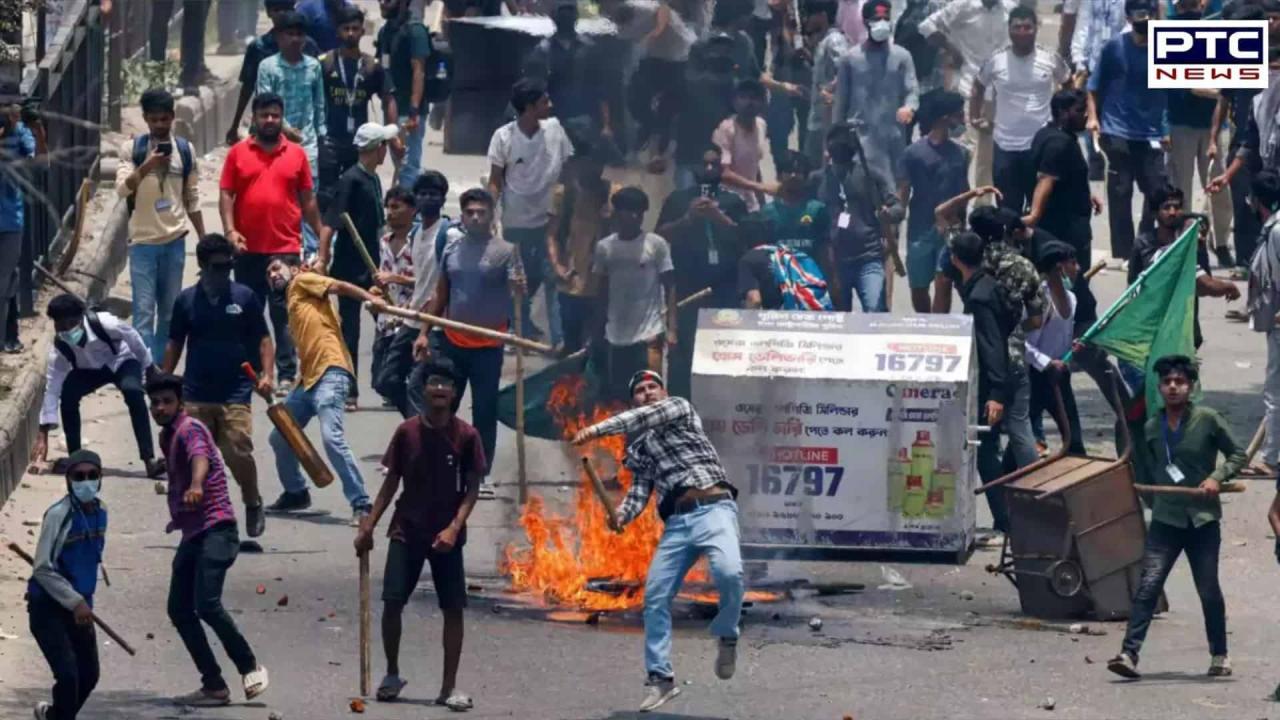PTC News Desk: The "Iron Lady," Sheikh Hasina, was forced to step down from her position as prime minister of Bangladesh after 15 years in office and leave the nation on Monday as widespread anti-government rallies reached a height. After three weeks of bloodshed and fatalities, Dhaka's streets burst into joyous celebrations upon her departure.
General Waker-Uz-Zaman, the head of the Bangladeshi army, announced that, barring the Awami League, the previous ruling party, consultations with political parties would soon result in the formation of a new interim administration. Declaring that it was "time to stop the violence" and that "all injustices will be addressed," he pledged to put an end to the crackdown that claimed the lives of over 300 people.
It is alleged that Hasina, who flew in on a military plane, will to apply for asylum in the UK. Sajeeb Wazed Joy, her son, refuted the reports and stated that she had no intention of going back to Bangladesh.
Here are the top developments:
- Sheikh Hasina left Bangladesh via helicopter and arrived on Monday at Hindon Airbase, which is located outside of Delhi. Hasina was greeted upon her arrival by National Security Adviser Ajit Doval and other high-ranking officials, who informed her of India's position over the developing circumstances in the neighboring country.
- Hasina intends to go to London in order to apply for asylum, according to sources who spoke with news agency PTI. However, following British Foreign Secretary David Lammy's demand for a thorough and impartial UN-led probe into the horrific violence in Bangladesh, her plans are now unclear.
- Hasina has spent the last 14 hours at Hindon Airbase, according to reliable sources who spoke with India Today, while she waits for UK clearance to continue her journey. During her visit, courtesy meetings are scheduled, and the Prime Minister's Office will be keeping a careful eye on things.
- Bangladesh's situation is still unstable; violence has persisted since Sheikh Hasina's departure. All government and private offices, companies, and educational institutions will reopen on Tuesday, according to a statement released by the Inter-Services Public Relations (ISPR).
- Many celebrated Hasina's departure from office, waving flags from the rooftop of her official Dhaka mansion. Images of demonstrators robbing the kitchen, stealing furniture and belongings, and laying in the beds went viral.
Also Read: India-Bangladesh border on high alert for next 48 hours; BSP steps up security measures
- Additionally, demonstrators surrounded the parliament building, yelling with joy and detonating what looked like smoke bombs. They vandalized murals and sculptures of Sheikh Mujibur Rahman, the former president of India, and looted and damaged property.
- Following weeks of deadly protests, the United States advocated the democratic and inclusive installation of an interim administration and appealed on all parties to "refrain from further violence".
- A "peaceful, orderly and democratic transition" and a "full, independent, impartial and transparent investigation into all acts of violence" were demanded by UN Secretary-General Antonio Guterres.
- Bangladesh was led by Sheikh Hasina since 2009. The economy expanded significantly during her leadership, with the GDP of the nation increasing at a rate of more than 6% annually on average. However, allegations of corruption, violations of human rights, and repression of political opposition brought condemnation against her regime.
- Concerns were raised about the impartiality of the elections that led to her comeback to power. Because of this, the opposition used the job quota protests as cover for an agitation to overthrow her government.
Also Read: Bangladesh PM Sheikh Hasina resigns, flees country amid massive protests and Army coup
- With inputs from agencies


